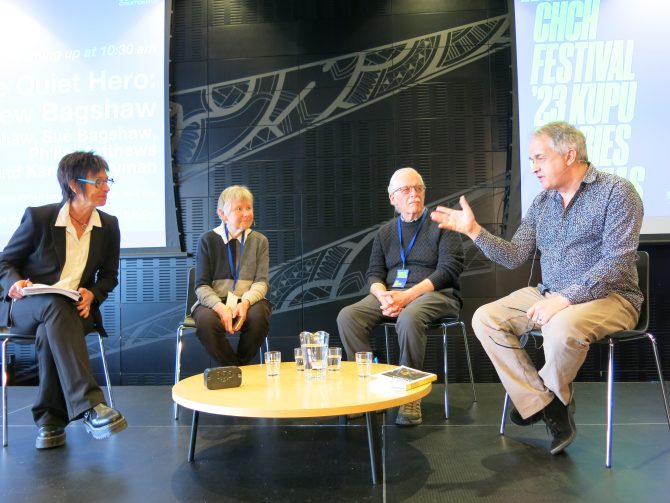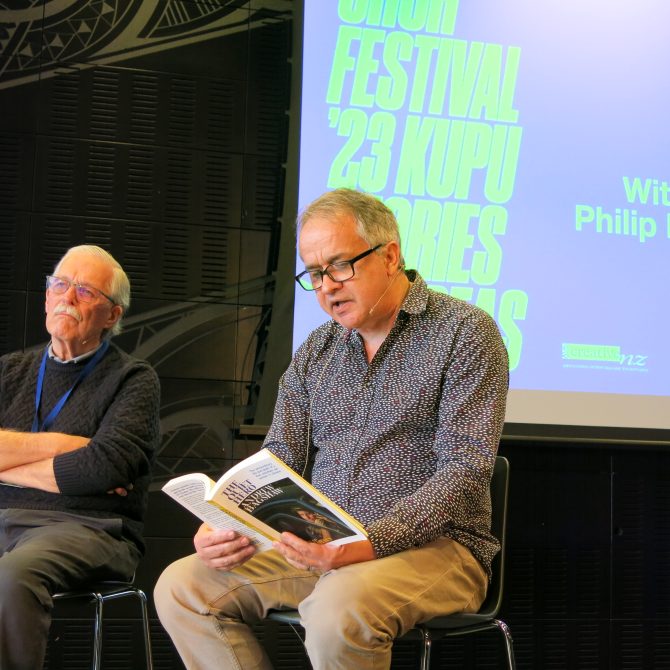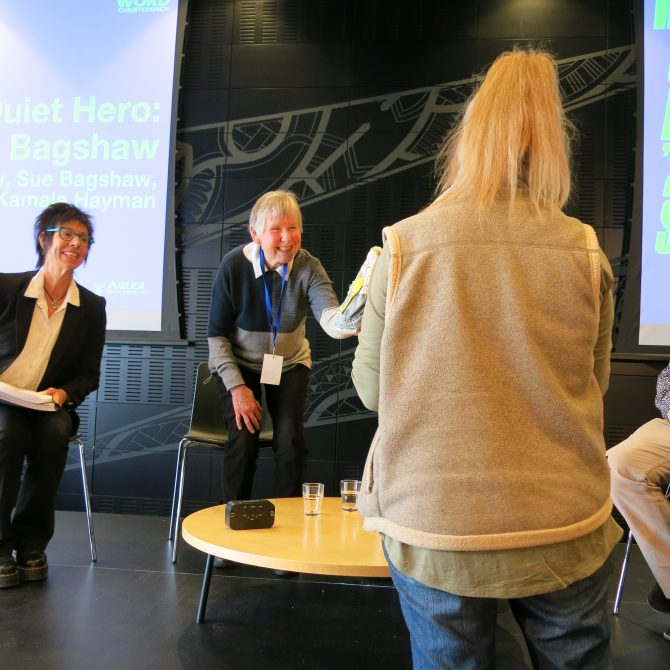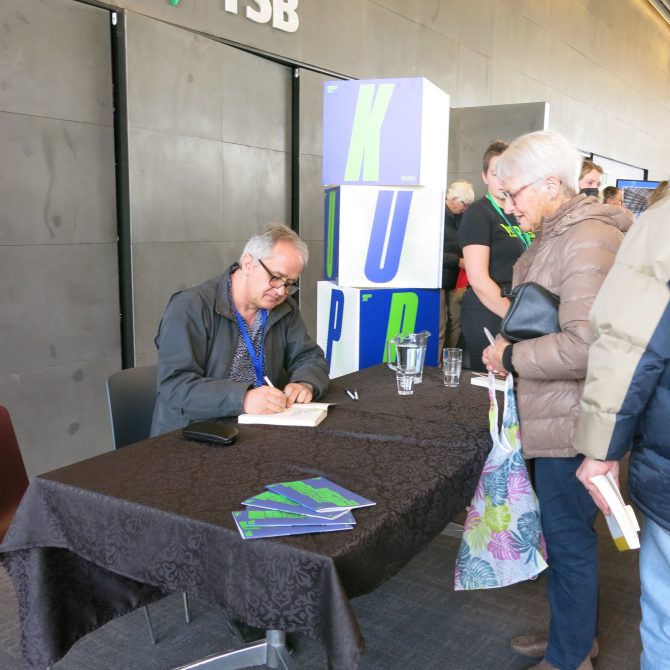This could have been a heavy session. Genetic scientist Andrew Bagshaw was killed in Ukraine while working as an aid worker - it was a war crime. His parents Dame Sue and Phil Bagshaw are dealing with the loss of their son, and the struggle of trying to find out exactly what happened to him. While I came away from this session sad, I was also thinking "Wow. What amazing people. This is the best that people can be." They are heroes.
Kamala Hayman, editor of The Press and Stuff Canterbury, chaired this session with Philip Matthews (senior writer at Stuff) who wrote The Quiet Hero - Andrew Bagshaw: The extraordinary life and death of a Kiwi aid worker in Ukraine alongside Sue and Phil. Together they explored the topics in the title - heroism, life, death, and the truly extraordinary lengths someone can go to do what's right.
The Quiet Hero: The Extraordinary Life and Death of A Kiwi Aid Worker in Ukraine
Andrew Bagshaw is the oldest son of Phil and Dame Sue Bagshaw. The Bagshaws are well-known and hugely respected in Christchurch - involved in founding the Canterbury Charity Hospital, and they have worked at the frontline of youth mental and sexual health advocacy. Both are Companions of the New Zealand Order of Merit - Sue for services to youth health, and Phil for services to health.
Philip came to Andrew's story via Kamala. She commissioned him to write Andrew's obituary for Stuff. Later Phil Bagshaw was looking for someone to write a book, and he approached Joe Bennett. Joe said "Try Philip Matthews".
Sue Bagshaw says Andrew was an early developer. He was walking and talking at a young age, and was a very serious child. He liked maths and cricket. Phil remembers a trip to Portugal when kids were getting excited about being on a jet plane. Andrew said "It's a Boeing 707 series 3 with a Pratt and Whitney engine"- aged a mere three and a half. The interest in planes continued. Phil has his pilot's license and Andrew got his when he got older, like his Dad. He did aerobatics, and Sue fondly remembers flying with Andrew.
Phil, Sue, and Philip talked more about Andrew's nature. Anecdotes from friends formed part of Philip's building of the book, and he acknowledged the paradox - Andrew was quiet and serious, but had lots of friends. He was individualistic but also a team player. He was also a genius. His PhD supervisor, Professor Neil Gemmell talked about Andrew's fierce intelligence. There's an obituary published on the University of Otago website that explores Andrew's brilliant academic career.
So why did a research geneticist go to Ukraine? He didn't have military or medical experience. This is one of the motivating questions behind Philip's book. Why? The answer is Andrew was very principled, with a strong moral compass. This makes sense in a family like his with such strong values of caring and supporting people in need. Andrew showed sympathy, empathy, and patience in looking after his grandmother who had dementia. He was also incredibly patient with his sister's kids.
Phil also considered family history - the Bagshaws had a long history of service. All of the men of the family went to World War One, but only Phil's grandfather returned. The young Andrew did a history of this time, and the map of Ypres looks eerily like Ukraine. Andrew felt that the war in Ukraine was an important moment in history too, that "something had to be done".
Phil said:
All we tried was to make our kids independent thinkers. We have every reason to be proud.
Philip read from the book, about a brutal August in which the Ukrainian city Soledar is evacuating citizens and "Soledar is burning in hell".
Andrew's parents and family wanted him to come home, but he loved it and felt he was making a difference. He got closer and closer to the frontline. The people he and fellow aid workers rescued were often elderly, confused, not quite there. Andrew and his British colleague Chris Parry (who was also killed) believed "A life is a life is a life". They did not value their own more highly than those of the people they were trying to rescue.
Instead of going to the UK for Christmas, Andrew took a priest to the frontline. He knew he wouldn't get back to Ukraine if he left (his visa had expired). The situation was becoming more dangerous, and the odds of survival were not in favour. And then, the worst news. Kiwi K.A.R.E. Ukraine heard Andrew and Chris had gone missing in Soledar. They had gone to evacuate an elderly lady. Two weeks later, the news came that Andrew and Chris had been killed by artillery shelling. The police visited Phil and Sue at 11pm at night to tell them.
It was a lie. Both men had been executed. Chris Parry's body was revealed to have a bullet in the torso and head. Both men were taken to the morgue at Kyiv. Both dressed in suits (Andrew never owned a suit).
Now Sue and Phil are trying to find out what really happened by tracking down coronial reports from Ukraine. It seems Andrew and Chris had been stopped by Russian soldiers or mercenaries from the Wagner Group. Sue says with quiet ferocity:
It was a war crime along with many many other war crimes.
Sue forgives those who killed her son, believing that mercenaries plucked from jail have had horrendous lives and "You don't get treated right, you don't behave right".
Looking at the wider context, they believe Putin will push further and he has to be stopped.
The Bagshaws are seeking justice, wanting the New Zealand government to take a strong stance. They also want to be registered as victims, as those registered in Ukraine can get access to documents. They know of at least two official investigations and the Ukrainian police still have Andrew's laptop. The Bagshaws want to go to the Security Council of the United Nations and speak out against mercenary armies:
The more we work together, the more we can achieve.
The final question from the crowd wasn't a question. An audience member gave Sue a Ukrainian doll to acknowledge the Bagshaws.
Philip Matthews ended the session on another note of hope. He and the Bagshaws wanted the book to be positive and inspiratonal. He talked about WORD guest David Keenan's reference to the affirming ending Ulysses: "yes I said yes I will Yes." Philip ended his book about Andrew too with one word, ecstatic and hopeful like the last words of Ulysses. That word is:
Amazing.
How can we help
- Sign the petition on global website Avaaz titled “Strengthen the power of the UN for peace - ban the power of veto in the Security Council”.
- Go to a charity cricket event. Andrew Bagshaw will be remembered at a charity T20 cricket match at Hagley Oval on Friday 10 November. It will be free for the public to attend and all proceeds will go to Ukrainian charities.
- Write to politicians and MPs to support the Bagshaws' kaupapa.
- Support the Ukrainian community in New Zealand.
- When it is up and running soon, support the Andrew Bagshaw Memorial Trust.
Find out more
- The reliable Mr Bagshaw an extract from the book in ReadingRoom
- WORD Christchurch website and 2023 programme
- Our WORD Christchurch 2023 page
- Follow @WORDChCh on Twitter
- Follow WORDchch on Instagram
- Like WORD Christchurch on Facebook
- Listen to WORD Christchurch podcasts








Add a comment to: WORD Christchurch 2023: Life, death, and doing the right thing – The Quiet Hero: Andrew Bagshaw